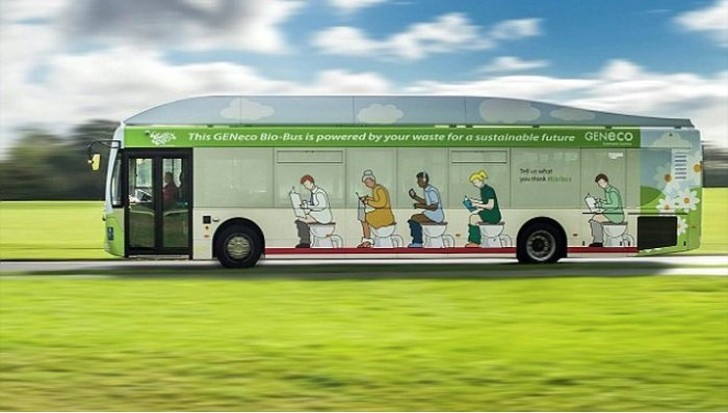In an effort to improve the city’s air quality and discover environmental-friendly fuels to power the urban busses, the city of Bristol will run a 4-week trial of a vehicle that literally runs on the citizen’s waste. The 40-seat “Bio-Bus” runs on bio-methane gas generated through the treatment of sewage and food waste.
Yes, it’s running on poo.
The project, which is run by the Bath City's Bus Company, is set to transport residents to the neighboring city Bristol's airport. The gas is generated at the Bristol sewage treatment works, run by GENeco, a subsidiary of Wessex Water. Apart from the fact the bio-fuel is made from the waste of the city’s citizens, it produces fewer emissions than traditional diesel engines. In other words, it’s both renewable and sustainable.
Called A4, the bus line that connects the Bristol Airport to Bath is rapidly growing, thus a greener transport would be quite good for the community. The Bath Bus Company claims the bus can travel 300 km (186miles) on a full tank of gas generated at the Bristol sewage treatment works.
“Up to 10,000 passenger are expected to travel on the A4 service during the 4 week trial period, which is available not only for airport travel, but also local journeys along the route through Saltford, Keynsham, Brislinton, Knowle and Hengrove. The timing of this trail could not be more appropriate as we approach 2015 when the City of Bristol itself becomes European Green Capital,” Collin Gield, engineering director at Bath Bus company explained.
In 2010, worldwide biofuel production reached 105 billion liters (28 billion gallons US), up 17% from 2009, and biofuels provided 2.7% of the world’s fuels for road transport, a contribution largely made up of ethanol and biodiesel.
In other words, despite it sounding quite weird, we all might soon enough realize that our waste is not really something you want to throw away.
The project, which is run by the Bath City's Bus Company, is set to transport residents to the neighboring city Bristol's airport. The gas is generated at the Bristol sewage treatment works, run by GENeco, a subsidiary of Wessex Water. Apart from the fact the bio-fuel is made from the waste of the city’s citizens, it produces fewer emissions than traditional diesel engines. In other words, it’s both renewable and sustainable.
Called A4, the bus line that connects the Bristol Airport to Bath is rapidly growing, thus a greener transport would be quite good for the community. The Bath Bus Company claims the bus can travel 300 km (186miles) on a full tank of gas generated at the Bristol sewage treatment works.
First ride, on Monday
The bus will carry its first fare paying passengers on the 08:00hrs departure from Bath to Bristol on Monday, November 24th.“Up to 10,000 passenger are expected to travel on the A4 service during the 4 week trial period, which is available not only for airport travel, but also local journeys along the route through Saltford, Keynsham, Brislinton, Knowle and Hengrove. The timing of this trail could not be more appropriate as we approach 2015 when the City of Bristol itself becomes European Green Capital,” Collin Gield, engineering director at Bath Bus company explained.
Biofuel is getting bigger by the day
Even though the auto industry is quickly turning its attention to the electric power drive, bio fuel is still winning a lot of terrain worldwide. In Europe, biodiesel is the most common biofuel, as it is usually used as a diesel additive to reduce levels of particulates, carbon monoxide and hydrocarbons from diesel-powered vehicles.In 2010, worldwide biofuel production reached 105 billion liters (28 billion gallons US), up 17% from 2009, and biofuels provided 2.7% of the world’s fuels for road transport, a contribution largely made up of ethanol and biodiesel.
In other words, despite it sounding quite weird, we all might soon enough realize that our waste is not really something you want to throw away.





